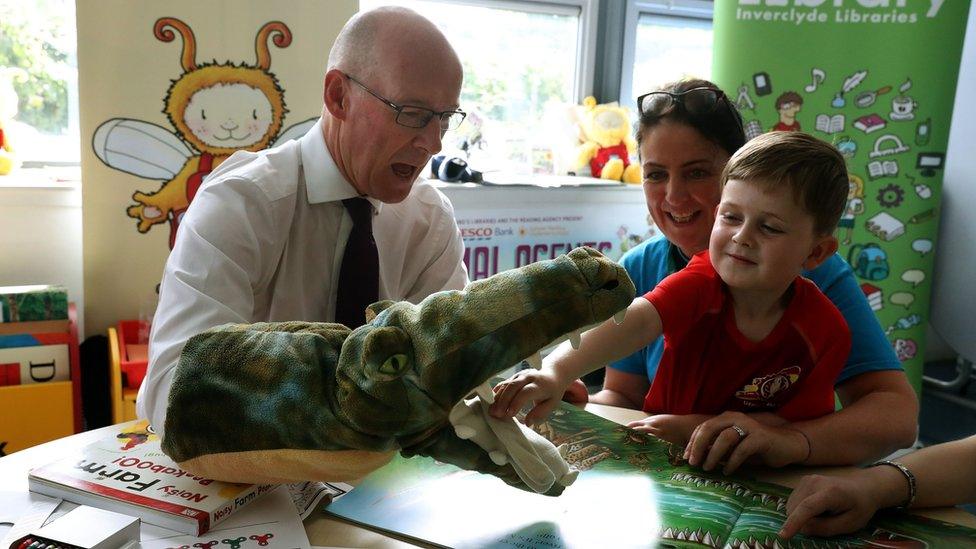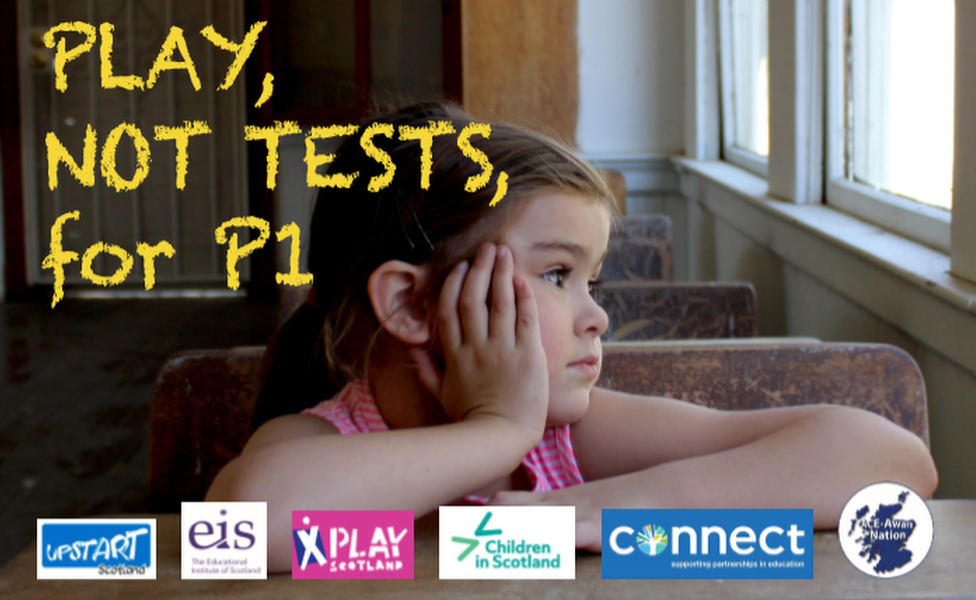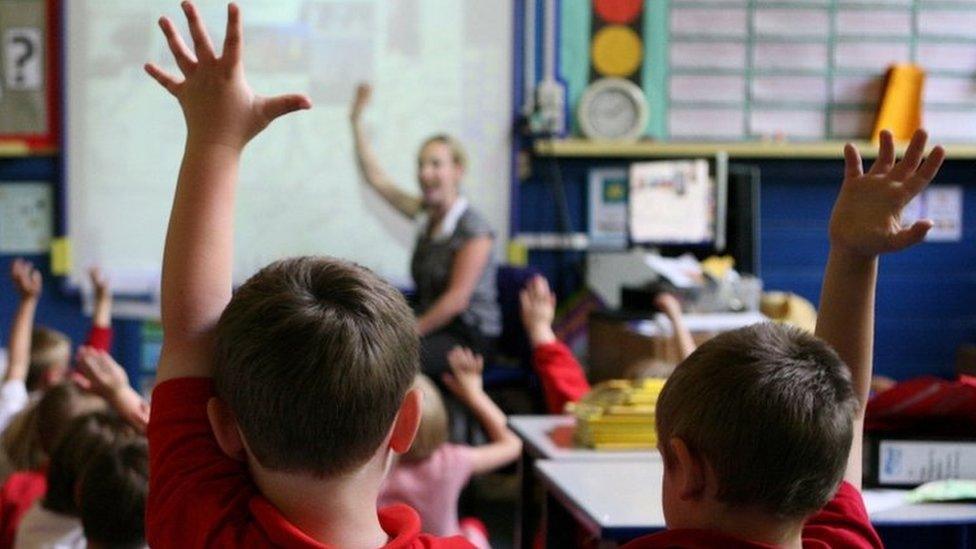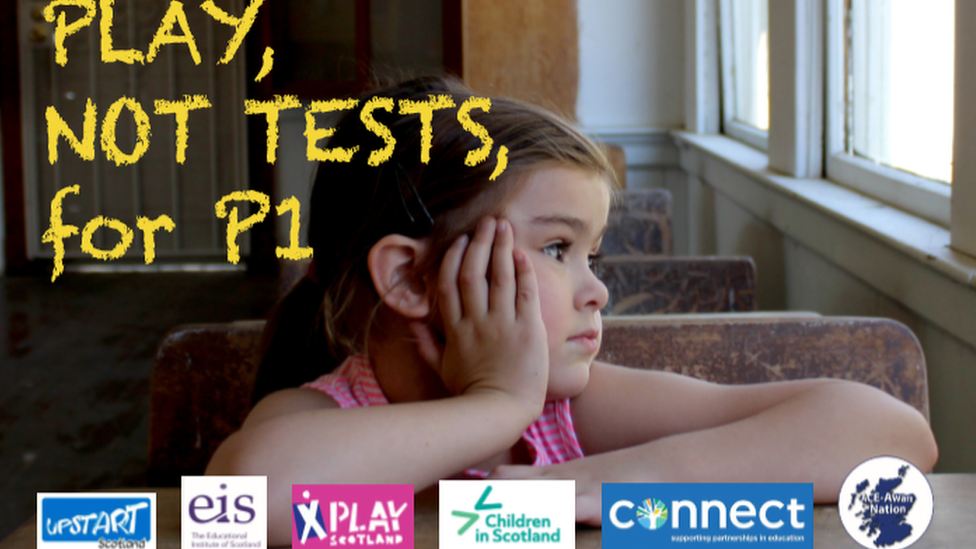Scottish education secretary defends tests for P1 pupils
- Published

John Swinney has called education the government's "defining mission"
Scotland's education secretary has defended tests being given to P1 pupils after admitting there were "mixed opinions" about them among teachers.
A major teaching union and opposition parties have swung behind a campaign to stop assessments for younger children.
But John Swinney said they help schools quickly identify "weaknesses and challenges" so they can be overcome.
He also denied there was a "crisis" in teacher morale and recruitment during a BBC Radio Scotland phone-in programme.
Standardised assessments were introduced in Scottish schools in 2017 in a bid to gather more data about the stage children are at in their learning.
Mr Swinney said "578,000 tests" had been carried out in the first year, calling this "a significant achievement" by teachers and pupils.
However the system has come under fire from some parents groups and teachers, with a campaign launched urging parents to write to schools in a bid to withdraw their children from the assessments.
All of Holyrood's opposition parties have spoken out against tests for the youngest children, and the EIS union has claimed pupils taking part have been left distressed.

A number of different parents and teachers groups have backed the postcard campaign against P1 assessments
Mr Swinney said he was "looking very carefully at the evidence", but mounted a defence of the reforms.
He said: "There's mixed opinions about the assessments. Some teachers are not keen on them, we've heard some of that from the EIS, but we've also heard from other members that the do see value in the assessments.
"The reason why I think they're important is that they're not there to create a league table, they're not there to put pressure on children. They're there to identify how young people are progressing in their learning in the earliest stages, so if there's a problem that a young person is facing in being able to acquire some of the basic skills in literacy and numeracy then we can identify those weaknesses and act as quickly as we possibly can do to address them.
"Standardised assessments help our educations to identify exactly where weaknesses and challenges are, so they can target their efforts to try to overcome them."
'Sense of perspective'
Groups including the EIS, Children in Scotland and Connect (formerly the Scottish Parent Teacher Council) have endorsed a campaign by Upstart Scotland for parents to boycott the assessments.
The government claims parents have no legal right to withdraw their children from tests, but noted that schools have discretion to decide whether pupils should take part.
Upstart Scotland chairwoman Sue Palmer said standardised testing has "narrowed the curriculum, encouraged teaching to the test and caused anxiety among children, parents and teachers".
However Mr Swinney said the the assessments should not cause stress, saying the primary one tests took "22 minutes in a year".
He added: "We need to keep this in some sense of perspective. Because what I do not want to happen is that young people come through our education system, have an issue which is not identified early enough, and all the international evidence tells us that if you don't identify an issue in an individual at the earliest possible opportunity it'll just get worse and worse."

Mr Swinney was also questioned about the workload facing teachers and staff shortages in schools by teachers phoning in to the programme.
One caller, Susan, said she had been a teacher for 39 years, 21 of them as a head teacher. She said the government's reforms were "not addressing the workload pressures" teachers are under.
She said the working-time agreement was "almost a joke", and said "there's no way teachers can do their work in the contracted hours".
Susan said the profession was "haemorrhaging" teachers because morale was "so low", telling Mr Swinney that "you have a real crisis with recruitment and retention".
Mr Swinney said he accepted that "teaching life is a very busy and demanding life", but said he had engaged with teachers and professional groups in a bid to improve matters.
He said: "I've taken action with the introduction of benchmarks to give greater clarity about what's expected to be achieved at different levels. I've taken action in relation to specifying workload reductions.
"I remain very open to other ways in which we can reduce workload for teachers. My door is very much open on this question, to reduce the amount of bureaucratic burden that teachers feel they are facing."
'Very challenging'
Mr Swinney conceded that some schools were short of staff, but denied there was a "crisis" in teacher morale.
He said: "What we have got us a very challenging period in education. We have some staff shortages. The last survey said we were about 800 teachers short, that's about 1.5% of the teaching contingency in Scotland.
"I'm in schools every single week, and I ask every time for private time, without officials, just for me to sit with teachers and say look, tell me what its like.
"I get a lot of very valuable - sometimes pretty tough - feedback from teachers about how they feel. I also get I have to say a lot of good feedback about how teachers feel they are supported and the difference they are making to young peoples lives.
"Of course there will be tough bits in all these discussions, but there are great bits as well. There are tough challenges, but also a lot of things to celebrate in Scottish education."
Susan said she was not reassured by Mr Swinney's words, saying: "I just feel it's 'crisis, what crisis', and he's not listening at all."
- Published15 August 2018
